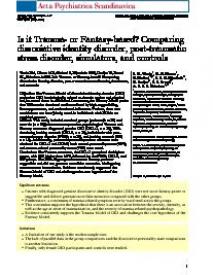Is it Trauma- or Fantasy-based? Comparing dissociative identity disorder, post-traumatic stress disorder, simulators, and controls
Objective: The Trauma Model of dissociative identity disorder (DID) posits that DID is etiologically related to chronic neglect and physical and/or sexual abuse in childhood. In contrast, the Fantasy Model posits that DID can be simulated and is mediated by high suggestibility, fantasy proneness, and sociocultural influences. To date, these two models have not been jointly tested in individuals with DID in an empirical manner.
Method: This study included matched groups [patients (n = 33) and controls (n = 32)] that were compared on psychological Trauma and Fantasy measures: diagnosed genuine DID (DID-G, n = 17), DIDsimulating healthy controls (DID-S, n = 16), individuals with posttraumatic stress disorder (PTSD, n = 16), and healthy controls (HC, n = 16). Additionally, personality-state-dependent measures were obtained for DID-G and DID-S; both neutral personality states (NPS) and trauma-related personality states (TPS) were tested.
Conclusion: For Trauma measures, the DID-G group had the highest scores, with TPS higher than NPS, followed by the PTSD, DID-S, and HC groups. The DID-G group was not more fantasy-prone or suggestible and did not generate more false memories. Malingering measures were inconclusive. Evidence consistently supported the Trauma Model of DID and challenges the core hypothesis of the Fantasy Model.
Geachte bezoeker,
De informatie die u nu opvraagt, kan door psychotraumanet niet aan u worden getoond. Dit kan verschillende redenen hebben,
waarvan (bescherming van het) auteursrecht de meeste voorkomende is. Wanneer het mogelijk is om u door te verwijzen naar de bron
van deze informatie, dan ziet u hier onder een link naar die plek.
Als er geen link staat, kunt u contact opnemen met de bibliotheek,
die u verder op weg kan helpen.
Met vriendelijke groet,
Het psychotraumanet-team.
In: Acta Psychiatrica Scandinavica, ISSN 0001-690X | 134 | 2 | August | 111–128
http://doi.org/10.1111/acps.12590


